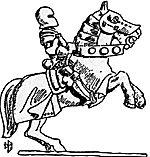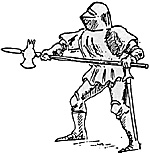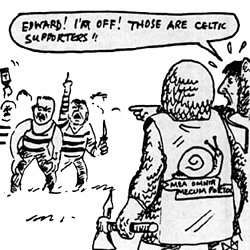 The Kingmaker PBEM (Play By E-Mail) game arose because I had been wanting to run some sort of PBEM over the winter. I discarded the idea of running a role-playing game because, although it is possible to do, it requires a lot of work to maintain any atmosphere to the game. For similar reasons (and because I was short of space) a skirmish wargame was out of the question, so I decided to run a boardgame and the obvious choice was a diplomacy-style game which would accommodate four to six players, such as Kingmaker.
The Kingmaker PBEM (Play By E-Mail) game arose because I had been wanting to run some sort of PBEM over the winter. I discarded the idea of running a role-playing game because, although it is possible to do, it requires a lot of work to maintain any atmosphere to the game. For similar reasons (and because I was short of space) a skirmish wargame was out of the question, so I decided to run a boardgame and the obvious choice was a diplomacy-style game which would accommodate four to six players, such as Kingmaker.
For those of you who haven't come across it, Kingmaker is a game of diplomacy and warfare set during the Wars of the Roses. Each player represents a faction of the noble families of the day and attempts to control the sole King. Complications arise from the actions of other players and event cards which can send nobles scurrying from one end of the country to the other to quell a raid or revolt. Kingmaker has been in publication, under one publisher or another, for over twenty years and is currently produced by Avalon Hill.
We began with four players: Craig Ambler, Graham Empson, Glenn Ellis and Peter Champion. Peter later dropped out due to pressures of work and his own increasing dissatisfaction with the game.
In order to play Kingmaker by Email, with the resultant fog of war, I had to make a few changes to the rules and the game itself. The game turns were processed once a week, with turn orders sent to me by each Friday and the turn results returned to the players by the following Tuesday.
Movement orders were given in standard compass directions and number of squares (example: 3 East, then 2 South East) and movement on the road had to be identified as such in the order otherwise I'd assume the player was moving parallel to the road. When moving across country players could specify that they would evade any other groups they met. If they did not specify that they were evading, any other group within 1 square either side of their line of march would bump into them and combat would ensue. If either group specified that they were evading, I drew an event card - if a noble present in either group was mentioned on the event card, the groups had bumped into each other and combat ensued - otherwise, both groups missed each other. I controlled all draws of the Crown and Event decks. The Chancery deck was held separately and apportioned according to the parliament rules by the player controlling the King or Chancellor of England.
 The players were encouraged to name and characterise the nobles in their hand - and this ranged from Graham attempting to follow the historical personages to Glenn making up completely cartoonish characters. With each turn's orders players could, and did, submit any scurrilous stories, 'facts' or 'news' about any nobles currently in play, or even recently deceased, to liven up the turn results (hence the characterisations) - this did not have to bear any more resemblance to the game than the fact that the nobles were in play at the time.
The players were encouraged to name and characterise the nobles in their hand - and this ranged from Graham attempting to follow the historical personages to Glenn making up completely cartoonish characters. With each turn's orders players could, and did, submit any scurrilous stories, 'facts' or 'news' about any nobles currently in play, or even recently deceased, to liven up the turn results (hence the characterisations) - this did not have to bear any more resemblance to the game than the fact that the nobles were in play at the time.
In order to speed the game up a bit, I removed the town cards from the deck, so that nobles and office cards came out quicker. This did not, as I had originally supposed it would, lead to overly large factions because the nobles were so scattered and the players used some of their nobles independently for scouting and other small tasks.
The early turns of the game were really spent getting a feel for how it was played with the 'fog of war'. Graham immediately took control of King Henry VI in London - and was to keep hold of him for an almost unprecedented (in any game of Kingmaker I've ever played, certainly) 17 turns until he was tragically killed in battle near Denbigh in North Wales. Glenn, as Archbishop of York (a title which was to become notorious in the game), marched into York and crowned Richard King of England. The battle was on.
Meanwhile Craig, who started with Percy, the strongest noble card in the game (and called by some, the one-man avalanche!) moved South from his base in Northumberland. He cunningly avoided getting close to Glenn's stronghold in York and so he wasn't detected until he turned up at Coventry in turn 3, causing much alarm amongst the other players.
Peter, on the other hand, began a series of moves and counter-moves along the South coast (most of them involuntary due to his office as Warden of the Cinque Ports) as he attempted to get round to Wales and kept getting called back, much to his disgust, by event cards.
The differences in playing styles quickly became apparent and were to dominate much of the rest of the game. Graham (and his daughter, Jennifer) evolved a style of play which involved attacking solitary nobles and/or their castles and avoiding major engagements. Craig, on the other hand, preferred to keep his forces together 'en bloc' wherever possible. Glenn relied almost entirely on his luck, as will be seen.
In turn 5, one of Glenn's nobles had been taken prisoner in Kent by Graham's forces. Glenn, in an attempt to reach the beleaguered noble, sent another one of his nobles to Rochester where he was surrounded by Graham's forces. Fortunately (for Glenn), the event card 'Chancellor of England calls Parliament if there is no sole King' coincided with Glenn receiving the Chancellor of England card in the card draw. So Glenn's noble was saved, and everyone went off to the Parliament at Whitby (Graham and Craig very kindly wrote me their impressions of the game at about this point - they are reproduced below).
Now Parliament, in Kingmaker, is an excuse to hand out office and title cards which increase a noble's power and influence. Glenn gave himself the most powerful cards, passing out the residue to the other players. This blatant example of powermongering caused the other three players to bring their forces together at Wressle castle ready to bring Glenn to book. Glenn, in turn, ran for York. So turn 6 began with the forces of three angry players assembled and ready to march out to an enormous battle against Glenn. Then I drew the first event card - plague in York. This is a classic (and looking back on it, really funny) example of how a Kingmaker player's fortunes can change drastically on the turn of a card. Glenn went from being firm favourite to win, with the strongest faction and control of the Yorkist King, to having one weak noble (Audley had been at sea at the time of Parliament and didn't die in York with the rest of Glenn's faction). It also meant that the other three factions were all sitting in the same square with no reason to be friendly any more. After a flurry of Emails, they agreed to a turn's grace to allow them all to get away from Wressle.
 There then followed a scramble for the remaining royal pieces, with Craig finally getting a Yorkist (Craig is from Yorkshire and it was a disappointment to him that the only royal he had managed to capture until then was a Lancastrian) and crowning him King Edward. It was around this time that Peter had to withdraw from the game due to pressure of work.
There then followed a scramble for the remaining royal pieces, with Craig finally getting a Yorkist (Craig is from Yorkshire and it was a disappointment to him that the only royal he had managed to capture until then was a Lancastrian) and crowning him King Edward. It was around this time that Peter had to withdraw from the game due to pressure of work.
Now the game is drawing to a close. The forces of King Edward (under Craig) met the forces of King Henry (under Graham) near Denbigh. During the battle, King Henry was killed and the Archbishop of York (the third unfortunate incumbent of the post) died too. Glenn, meanwhile, continued to thrash around in the South-West, bumping into Graham's forces and coming off worst. As I write, one of Glenn's nobles has been trapped against the coast near Plymouth by three of Graham's nobles. But Glenn's rather fickle luck has once again saved him - Craig has called a Parliament.
As we enter the final phase of the game, Graham holds the last Lancastrian royal - Beaufort, Duke of Somerset - but he has no bishops to enable him to crown Beaufort king. Craig holds King Edward and Glenn holds Richard of Gloucester - the last two Yorkists. So Craig has to kill Graham in order to win, while Graham has to kill Craig and Glenn.
Glenn has to kill Craig, crown Richard king, and only then kill Graham if he is to win. Of course, this will all be made so much easier if they go to Parliament! The best is yet to come.
More Kingmaker
Back to Table of Contents -- Lone Warrior #123
Back to Lone Warrior List of Issues
Back to MagWeb Magazine List
© Copyright 1998 by Solo Wargamers Association.
This article appears in MagWeb (Magazine Web) on the Internet World Wide Web.
Other military history articles and gaming articles are available at http://www.magweb.com
